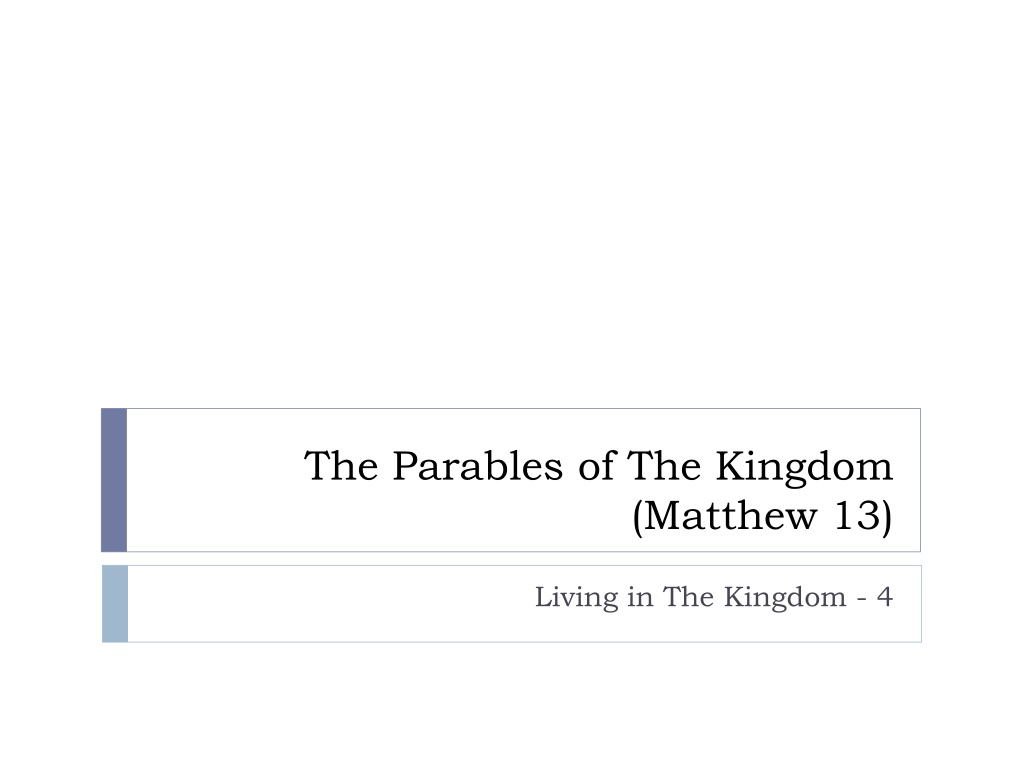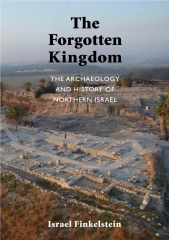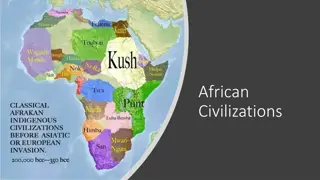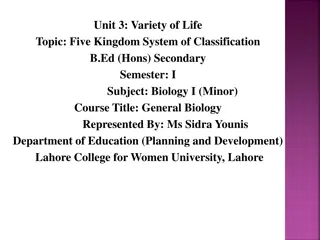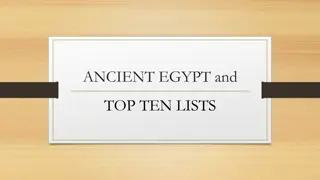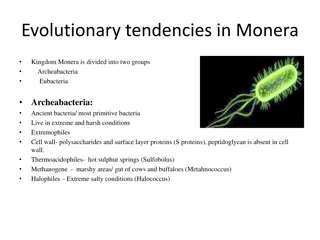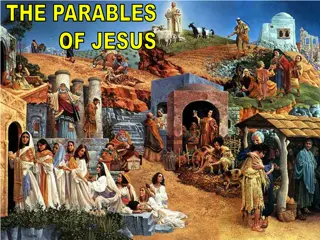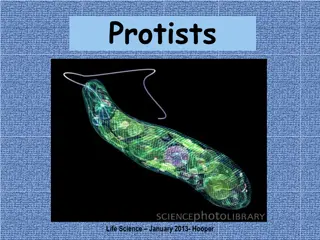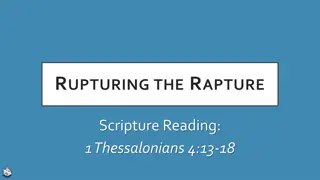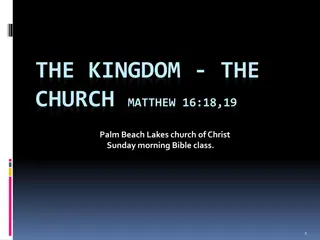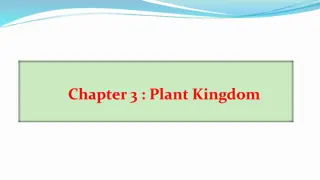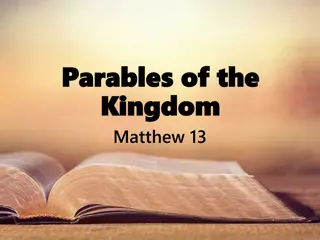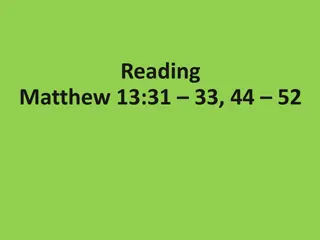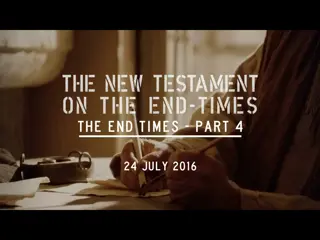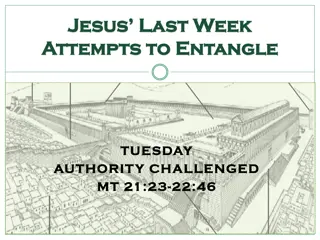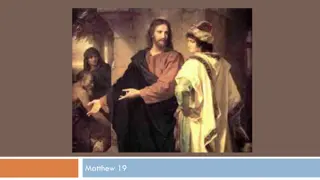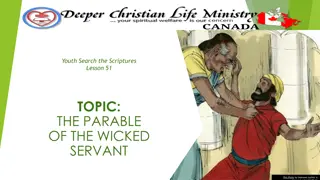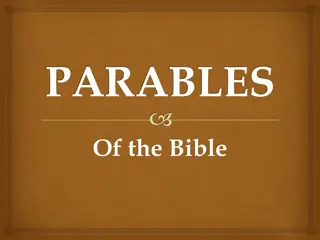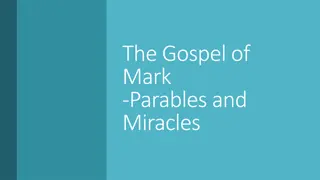Understanding the Parables of the Kingdom
Explore the analogies and lessons of the Kingdom of God through the parables of Jesus, focusing on the significance of using analogies, the Law of Correspondence of Heaven and Earth, and discussions on the analogy of God as a Shepherd seeking the lost sheep.
Download Presentation

Please find below an Image/Link to download the presentation.
The content on the website is provided AS IS for your information and personal use only. It may not be sold, licensed, or shared on other websites without obtaining consent from the author. Download presentation by click this link. If you encounter any issues during the download, it is possible that the publisher has removed the file from their server.
E N D
Presentation Transcript
The Parables of The Kingdom (Matthew 13) Living in The Kingdom - 4
Parables The Kingdom of God is a spiritual reality, however the Bible tells us that it is not a completely strange and unknowable spiritual reality. In fact there are very deep analogies between the principles of Creation and the principles of the Kingdom and some of these deep analogies are set out in the parables of Jesus. An analogy is when something is like something else in a way that maps onto the other thing, so that inferences can be drawn or conclusions can be made. So when we say that Christ is the Head of the Church which is His bride then we are using human marriage (the known thing) as a map that tells us how God s love for His Church (unknown thing) operates. Because the map is very close we can press that particular analogy a long way and talk about faithfulness, love, submission, sacrifice etc. Some analogies are very poor analogies and not very useful e.g. saying the earth is like a basketball
Is Like Unto The parables often start with a key phrase that indicates the analogy e.g. the Kingdom of God is like unto so we know the two things which are being compared e.g. the Kingdom of God and a field or a dragnet. And the analogy can only be pressed as far as the similarity is valid. For instance it would be incorrect to say that the Kingdom of God is constructed from soil (field) or is carried in a fishing boat (dragnet). Parables are mainly found in the Synoptic Gospel (Matthew, Mark and Luke) which are written for solely Jewish audiences (Matthew) or combined Jewish and Gentile audiences (Mark, Luke). John s gospel has no parables and was written primarily for Greek-speaking churches in Ephesus and Asia Minor (Turkey) and thinks in terms of symbols rather than in terms of similarities and parables. So the key thought is that parables are like maps of the Kingdom of God, however the map is not the territory and they only give us partial information and can only be pressed so far. In this lesson we will examine the parables in Matthew chapter 13.
Definitions Definitions: An is a relation of similarity between two or more things, so that an inference (reasoning from premise to conclusion) is drawn on the basis of that similarity. So if item or person or process A is known to have certain characteristics, and if item or person or process B is known to have at least some of those characteristics, the inference is drawn that B also has those other characteristics. If the cases are not similar enough to warrant the inference, then it is a false analogy. The Law of Correspondence of Heaven and Earth: Matthew 16:19 I will give you the keys of the kingdom of heaven, and whatever you bind on earth shall be bound in heaven, and whatever you loose on earth shall be loosed in heaven." (see also Matthew 18:18)
Discussion 1 When the Bible says that God is a Shepherd seeking the lost sheep is that a good analogy or a poor analogy? In what ways is God like a shepherd seeking the lost sheep (Luke 15) ? In what ways is God not the least bit like a shepherd? What do we mean by the map is not the territory ?
Spiritual Sensitivity Matthew 13:10-17 Discussion: How is it blessed to be spiritually perceptive? What happens to those who have more ? On the other hand what happens to those who are dull of hearing?
The Parable Of The Sower Matthew 13:1-9, 18-23 Discussion: How is the parable of the Sower the master parable which gives us the keys to Jesus use of analogy? What is its meaning? What does it tell us about the spiritual life? In this parable, how do heaven and earth correspond to each other?
The Wheat And The Tares Matthew 13: 24-30, 36-43 Discussion: What does the parable of the wheat and the tares tell us about the nature of the Kingdom of God? How does it build upon the symbolism in the parable of the sower? How does this parable introduce a more complex mapping of the spiritual world and the natural order? What does it tell us about the nature of evil? Why is God patient with evil?
Mustard Seeds Matthew 13:31,32 Background: The mustard tree was a rapidly multiplying pest that grew everywhere and took over entire fields as the mustard seed was blown by wind. It was against the law to plant it anywhere near someone else s field. Discussion: How is the mustard seed s growth like the Kingdom of God? How is the Kingdom of God a pest to the kingdoms of this world?
The Hidden Kingdom Matthew 13: 33-35, 44-46 Discussion: All these parables indicate that the Kingdom is secret, hidden or obscure in some way. They also show people discovering it, or the Kingdom being revealed b its leaven-like influence. They also indicate the great value of the Kingdom. Have we made Christian truth too easy and too cheap ? Why does God want us to seek Him out and to pay a price of some sort for the Kingdom? What price did the disciples pay in order to learn about the Kingdom from Jesus? Is there a connection between the price we are prepared to pay for truth and our joy at finding it?
Ultimate Separation Matthew 13:47-50 Discussion: What does this parable tell us about the end of the age? How do the angels sort out the good from the bad? What is meant by sorting the good into containers ?
Scenario Question Someone says the following: I don t believe that anyone is going to Hell. Everyone hears God and knows God and a loving God would never send anyone to Hell. I just don t believe that Jesus would do that! From Matthew 13 show them: A) The difference between our spiritual sensitivities B) The difference between the righteous and the wicked C) What happens to the righteous and the wicked D) How they should seek the Pearl of Great Price.
